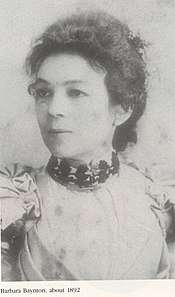Barbara Baynton
| Barbara Baynton | |
|---|---|
 Barbara Baynton, about 1892 | |
| Born |
Barbara Janet Ainsleigh 4 June 1857 Scone, Hunter River district, New South Wales |
| Died |
28 May 1929 (aged 71) Melbourne |
| Occupation | Writer |
| Nationality | Australian |
| Period | 19th century |
Barbara Janet Ainsleigh Baynton, Lady Headley (4 June 1857 – 28 May 1929) was an Australian writer, made famous by Bush Studies.
Life
Baynton was born in 1857 at Scone, Hunter River district, New South Wales, the daughter of Irish bounty immigrants,[1] John Lawrence and Elizabeth Ewart, although she claimed to be born in 1862 to Penelope Ewart and Captain Robert Kilpatrick, of the Bengal Light Cavalry.[2] This fiction gave her "entrée to polite circles as a governess" and, in 1880, she married Alexander Frater, the son of her employers.[2] They soon moved to the Coonamble district, and had two sons and a daughter. However, Alexander Frater ran off with her niece,[3] Sarah Glover, in 1887, and Barbara moved to Sydney and commenced divorce proceedings. A decree absolute was granted 4 March 1890.
On 5 March 1890 she married Dr Thomas Baynton, a retired surgeon aged 70 years who had literary friends. A few years later she began contributing short stories to the Bulletin. Six of these were published in 1902 in London by Gerald Duckworth and Company Ltd under the title of Bush Studies because Mrs Baynton had been unable to find a publisher for them in Sydney. Alfred Stephens, a close friend, reviewed the book in the Bulletin and stated: 'So precise, so complete, with such insight into detail and such force of statement, it ranks with the masterpieces of realism in any language. Percival Serle, however, found that The building up of detail, however, is at times overdone, and lacking humorous relief, the stories tend to give a distorted view of life in the back-blocks.
Baynton's husband died on 10 June 1904 and left his entire estate to her. She invested in the stock market, bought and sold antiques, and collected black opals from Lightning Ridge.[2] In 1907, her only novel, Human Toll, was published, and in 1917 Cobbers, a reprint of Bush Studies with two additional stories, appeared. During World War I Mrs Baynton was living in England and in 1921 she married her third husband Baron Headley.
Barbara Baynton died at Melbourne on 28 May 1929. She was survived by Lord Headley, and her two sons and daughter by the first marriage.
Bibliography
Novel
- Human Toll (1907)
Collections
- Bush Studies (1902)
- Cobbers (1917)
Major individual works
- "The Chosen Vessel" (1896) - short story
- "Fragments: 1 Day-Birth" (1899) - poem
- "A Dreamer" (1902) - short story
- "Billy Skywonkie" (1902) - short story
Notes
- ↑ Immigrants who were offered free passage by entrepreneurs who were paid an amount (i.e.bounty) per person for the eligible immigrants they brought into the colony, usually in shiploads
- 1 2 3 Carter (2003) p. 13
- ↑ Baynton, Barbara (2012). Bush Studies. Text Publishing House: Melbourne. p. xii. ISBN 978-1-92207-949-7
References
- 'Baynton, Barbara Jane (1857 - 1929)', Australian Dictionary of Biography, Volume 7, MUP, 1979, pp 222–223.
- Carter, Jennifer M. T. (2003) "'Getting to know you': Illusive writers" in National Library of Australia News, XIV(2): 11-14, November 2003
- Serle, Percival (1949). "Baynton, Barbara". Dictionary of Australian Biography. Sydney: Angus and Robertson.
External links
| Wikisource has original works written by or about: Barbara Baynton |